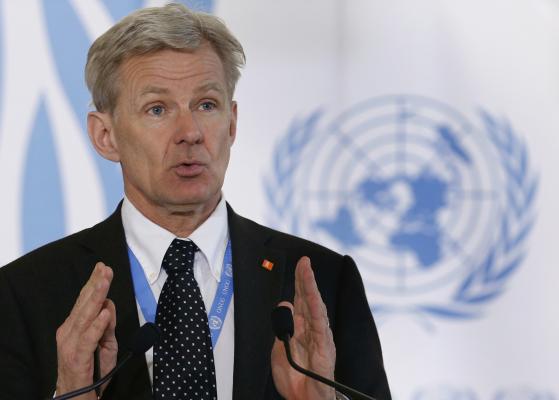
Special advisor to the United Nations Special Envoy for Syria Jan Egeland addresses a news conference after a meeting of the Task Force for Humanitarian Access at the U.N. in Geneva, Switzerland, March 17, 2016. REUTERS/Denis Balibouse
After aid convoys set forth on their way to four Syrian towns on Thursday, they were faced with the government still refusing aid to six besieged towns and blocking the provision of medical care to needy people, needed it, U.N. humanitarian advisor Jan Egeland said.
“We need the government of Syria really to help us in the medical area. Why not get in the nutritional stuff, vitamins and antibiotics, and doctors and nurses to these places? I hope there would be a real breakthrough on this in our contacts with the government,” he told reporters.
“It is a violation of international law to prevent us from going,” he said. “I cannot understand why we cannot go there. Even wounded fighters have a right to be treated under international law.”
Egeland, speaking after hosting a regular meeting of countries involved in the Syrian peace process, said many innocent civilians were still in detention, including children. He urged the United States, Russia and other countries to help get them released.
Egeland said after aid was delayed twice last week because of fighting, it was finally being delivered to the towns of Zabadani, Foua, Kufreya and Madaya on Thursday.
The Syrian government needed to give an answer within seven days on permission for convoys to go to six more areas, which its forces are still besieging almost three weeks into a truce, Egeland said, in hope of reaching 1.1 million people by the end of April and vaccinating all unvaccinated Syrian children.
The United Nations also wants to drop aid into the town of Deir al-Zor, which is under siege by ISIS terrorist group, after an unsuccessful previous attempt.
Egeland warned that the plane has to fly fast and high to avoid the threat of surface-to-air missiles, adding that better parachutes would hopefully enable the aid palettes to withstand the shock.
Gareth Bayley, Britain’s special representative for Syria, said the humanitarian taskforce and a similar ceasefire taskforce, both composed of major and regional powers, had made “slow progress but progress nonetheless”.
“Today we have a glimmer of hope, a slightest hope,” Bayley told the Swiss Press Club in Geneva.
